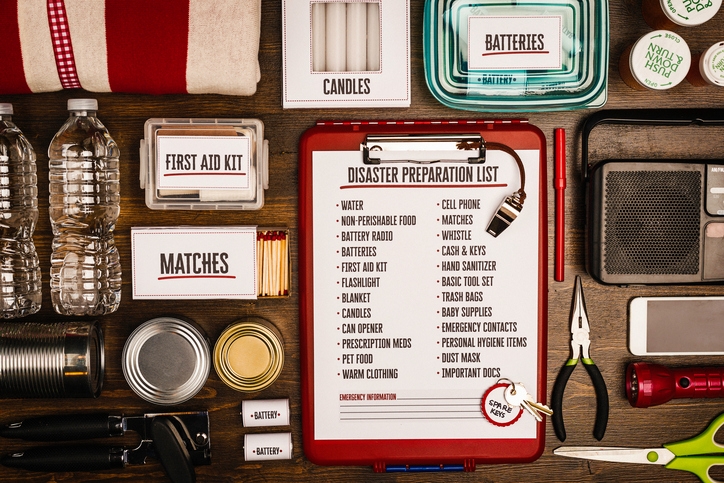Keep Your Family Safe from Inclement Weather with Food Lion
December 07, 2018 | Food Lion


Keeping Your Family Safe from Inclement Weather
Preparing for inclement weather can be daunting, even for the most organized people. The effects of a storm can last a few hours or several days; without heat, power and communication services; and place older adults, young children, and sick individuals at a great risk.
Let your local Food Lion help your family stay safe by following these easy tips for incoming severe weather- snow storms, hurricanes, tornadoes, or blizzards.
1. Take pictures of your things
Photograph every room in your house, your car, and important serial numbers or passwords. These can be used as a record for insurance purposes. It’s not a bad idea to take pictures of your driver’s license and important documents as well. Make sure you save to the cloud!
2. Don’t forget your four-legged friends!
Stock up on extra food, water, and any medications they take. Make sure you have their favorite toy or stress blanket in case they get scared.
3. Keep your cell phone charged
Make sure your cell phone is fully charged as well as everyone else’s in your family. If you have a portable charger, make sure that is charged as well. If you have multiple cell phones available, turn some of them completely off as backup in case others run out of battery.
4. Take a look around your property to make sure everything is up to standards
Cut down hanging tree branches or wayward limbs, check your windows and doors, and secure any outdoor furniture. Make sure that fences are shut and locked properly. Take pictures of the outside of your home as well.
Before the snow starts, buy a snow shovel and stock up on ice melt to clear your walkways right after snow fall. When the weather is very cold outside, let the cold water drip from the faucet served by exposed pipes. Running water helps prevent pipes from freezing.
5. Get important documents together in a water-proof container
Gather your passports, social security cards, driver’s licenses, and emergency contact information in one place that is easily accessible. Also think about putting valued pictures in plastic storage bags and sealing them shut with duct tape.
6. Limit your time outside
Keep off the roads and stay inside your home if at all possible. If trapped in your car, then stay inside of it. If you need to go outside, then wear appropriate clothing for the weather- rain coat for rain and warm layers for snowstorms.
7. Drive only when you must and avoid traveling alone
If you need to seek shelter, inform others of your schedule and destination. Ensure you have a full tank of gas.
Make sure to bring an emergency kit, including but not limited to, cat litter for snowstorms (placed behind your tires can help add traction if you get stuck on the ice), jumper cables, extra clothes (warm layers in the event of a snowstorm) a sleeping bag/pillow, a first aid kit, and plenty of food and water.
8. Make sure you have an emergency kit at home and in your car
Food Lion has everything you need to stock up on emergency essentials. Here are just a few necessities to keep in your home:
Food:
- Apples
- Canned and dried fruits
- Ready-to-eat canned vegetables
- Canned tuna, salmon, and sardines
- Nut butter
- Granola, trail mix, energy bars
Non-Food:
- Bandages
- Prescriptions
- Antiseptic
- Hygienic supplies
- Working flashlight
- Battery powered radios
- Extra batteries
- Can opener
- Matches or lighter
- Candles
- Plastic storage bags or containers
- Toilet paper
- Hand sanitizer
Car Supplies:
- Jumper cables
- Flares or reflective triangle
- Ice scraper
- Car cell phone charger
- Blanket
- Map
- Cat litter or sand for better tire traction
If you have been evacuated or displaced and cannot return to your home, FEMA.org has resources to help you with finding immediate short term housing and longer term housing needs after a disaster.
With these handy tips and listening to the latest weather forecasts and road conditions, you can be prepared for the worst of storms and keep your family safe.






Create Your Display Name